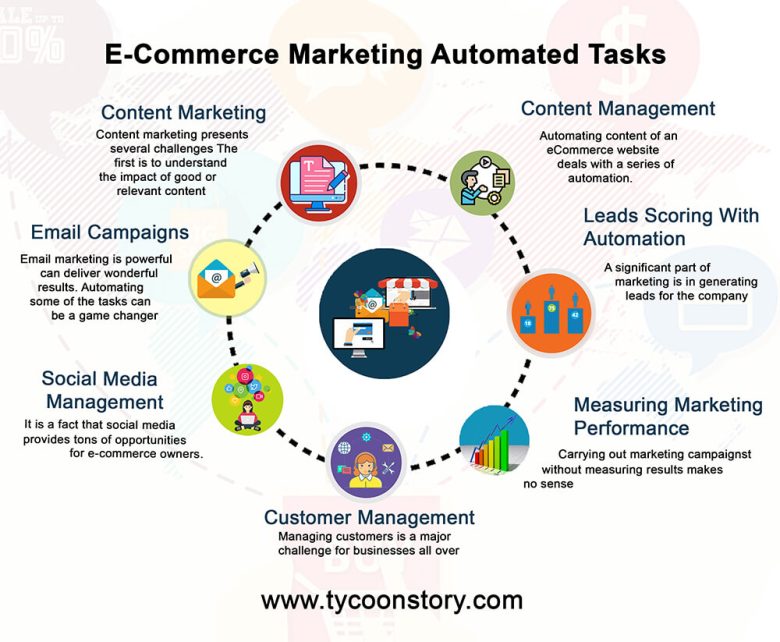Do you run your eCommerce platform without automation? If yes, it is time to rethink your strategies. You see, automation has so many benefits. The most obvious aspect is the time-saving aspect. Jobs that would take hours or days can now move a lot faster. Automating certain e-commerce marketing tasks can significantly streamline operations, improve efficiency, and enhance the customer experience.
The removal of dependence on humans increases efficiency. No more having to contend with sick-off or inattentive employees.
Have you wondered about the ineffectiveness of some of your marketing strategies? Take the example of email marketing. There could be an issue with audience segmentation. The other is a lack of personalization or the inconsistency of the send-outs.
What about your content management? Does the marketing team find it challenging? Are they unable to come up with relevant material? Do you find that despite churning out articles, your SEO remains lacking?
The answer to all these questions may lie in automation. Let’s look at some tasks that you should automate from today going forward.
1. Content Marketing
Content marketing presents several challenges. The first is to understand the impact of good or relevant content. It’s not about sitting in front of a computer churning out material.
There is a thought process and strategy that goes into everything. The teams must undertake proper market research. Who are you talking to, and what kind of content do they want? Data gathering, management, and analysis are all time-consuming.
Coming up with topics, actual writing, and SEO can be an uphill task. Content marketing automation saves time and improves efficiency. This allows for the centralization of data.
Cloud facilities improve remote working and collaboration among teams. You can optimize product lists and pages thus improving the quality of messages.
Content marketing software can also help with social media management. You get better-quality posts, reports, and so much more.
AI-powered software can analyze market trends using data. They then recommend relevant topics to cover. Digital marketing teams can concentrate on other core areas requiring their attention.
2. Content Management
Automating the content of an eCommerce website deals with a series of automations. The content may be in the form of text, images, banners, or product badges.
Without automation, this task can be hectic as manual work takes time and requires a lot of effort in creating and managing each and every element of the page. Whereas automation gets the work done with no manual effort.
This can help businesses stay updated with the latest content on their eCommerce website. All one needs to do is give the data and let the automation do its work. Since eCommerce is continuously growing, every store owner should be able to automate their content.
Currently, storefront automation platforms are available which can benefit store owners in automating their content even without code. So, there is no extra effort needed to learn coding or hire external resources to automate the elements of the eCommerce store.
3. Email Campaigns
Email marketing is powerful and can deliver wonderful results. Automating some of these tasks can be a game-changer. They can help with:
• Scheduling of send-outs, thus ensuring consistency in your communication.
• Target audience segmentation for better reach.
• Provide opt-ins for subscriptions, eBooks, and newsletters, to name a few.
• Creation and generation of content for newsletters.
• Drip campaigns for automatic sending out of tailored content to specific audiences.
• Better email personalization. Audiences are more likely to open an email that you address to them, rather than a general one.
• Customized emails depending on the customer journey.
• Attractive, easy-to-use templates. The teams don’t have to spend hours coming up with engaging designs.
• Retarget ads and send follow-ups to recent site visitors.
4. Customer Management
Managing customers is a major challenge for businesses all over. You need a full-time team to be at hand to respond to customer queries or concerns. Automation can help the marketing team in several ways.
Take the example of AI chatbots. They can assist with:
• Conversational marketing is more effective than verbal communication. Customers feel like they’re interacting with actual humans. They are more likely to convert to buying customers.
• Prompt responses to customers, due to 24/7 availability. Unlike humans, chatbots do not go to sleep. They will work all year round, ensuring you always take good care of the customer.
• Product recommendations based on past shopping behavior.
• Personalization of communication to enhance the customer experience
• Collection of valuable data that’ll help in future decision-making.
5. Social Media Management
It is a fact that social media provides tons of opportunities for e-commerce owners. The audience reach is vast. And, there is no limitation on the number of accounts you can open.
However, managing all social media platforms can be difficult. Generating relevant posts, maintaining consistency, and tracking results takes time and attention.
Automation software can relieve the marketing team from some of the tasks. You can, for example, preschedule posts to go out at specific times.
Automation can help the team keep better track of contacts. The tool can curate and recommend the most relevant keywords. Analytics will let them know who is visiting and what kind of content they are interacting with.
6. Leads Scoring With Automation
A significant part of marketing is in generating leads for the company. The quality of leads must provide high chances of conversions. In this way, there is no time wastage in following up cold leads. Marketing automation software with lead scoring can help.
Automation uses pre-established qualification criteria to determine good leads. The software will, for instance, determine which audiences interact with the marketing communication. It looks at trends or patterns in behavior.
Active consumption of such indicates that this is a prospect worth following up on. The recipient who sends marketing emails to junk folders is a cold lead. In this case, an opt-out email would work.
Marketing teams can clean up their lists by removing any people who are not likely to convert.
7. Measuring Marketing Performance
Carrying out marketing campaigns without measuring results makes no sense. How will you know what is working or not? Analytics tools are a lifesaver for marketers. They allow for the collection of data from different sources.
Tracking campaigns and measurable results against preset benchmarks is easier. Take the example of Google Analytics. The free tool will let you know how well the website is performing. It shows what content or pages audiences interact with the most. It provides an opportunity to improve upon what you are doing.
Web analytics helps monitor page loading times. It also shows downloads, the geographic location of audiences, and so much more. Such information provides fantastic insights to help in future marketing decision-making.
Final Thoughts
The world is a much better place due to technology. Marketing automation improves efficiency in processes. Savings in time and resources are worth the Investment in such software.
But the company must still invest in having the right team. You cannot, for example, turn over all social media marketing to automation. The platforms demand human interaction at some level.
Determine what your marketing needs are. Let’s say your main challenge is in content generation or management. Also, content management software would make sense. Just invest in what will make a difference to your processes.






